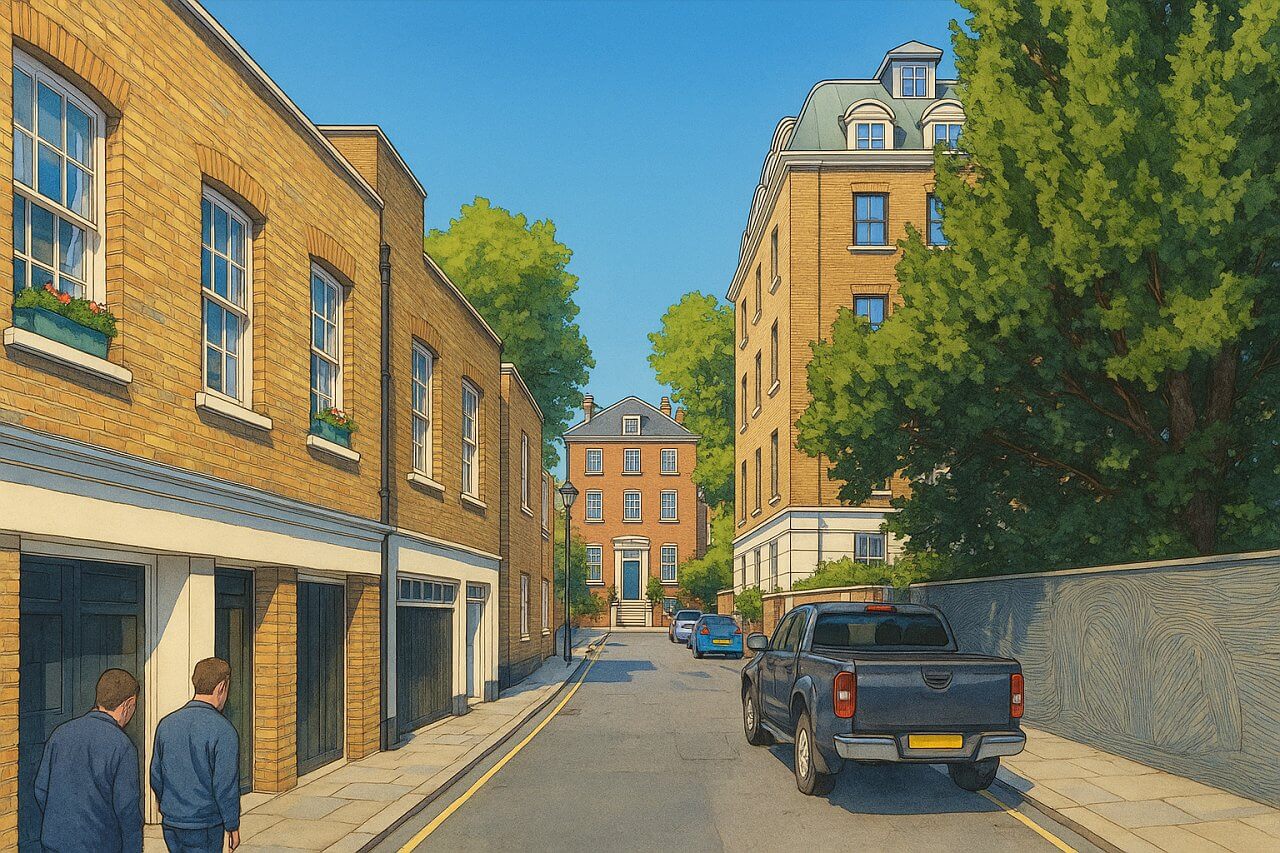
Montrose Place, London
Montrose Place is a short but refined street nestled in the heart of Belgravia, one of London’s most prestigious neighbourhoods. Measuring just 138 metres (453 feet) in length, it connects Halkin Street at its northwestern end with Chapel Street to the southeast. Despite its compact size, Montrose Place plays an important role in the local street grid and exemplifies the upscale residential character that defines Belgravia.
Street Layout and Traffic Flow
Montrose Place is accessible to two-way traffic throughout its length. However, it connects to Halkin Street, which is a one-way street. As a result, vehicles exiting Montrose Place at its northwest end may only turn left onto Halkin Street. This traffic regulation contributes to the generally calm and low-traffic atmosphere that makes the area appealing to residents and pedestrians alike.
History and Development
Montrose Place forms part of the late 20th-century redevelopment of portions of Belgravia. While much of Belgravia was laid out in the early 1800s by Thomas Cubitt under the direction of the Grosvenor Estate, Montrose Place came into being in the 1990s as part of the regeneration of land adjacent to the former British Army headquarters at Hyde Park Barracks. The street was planned with a focus on prestige and privacy, complementing the area's broader architectural fabric.
Origin of the Name
The street is believed to be named after the title of Duke of Montrose, a noble title in the Peerage of Scotland. This follows the tradition of naming streets in Belgravia after aristocratic titles, many of which were associated with the extended Grosvenor family and their allies. The name is pronounced MON-trohss, with emphasis on the first syllable. In the International Phonetic Alphabet (IPA), it is transcribed as /ˈmɒn.trəʊs/. 
Character and Atmosphere
Montrose Place is best described as exclusive, private, and tranquil. The street is lined with modern townhouses and apartment buildings that mirror Belgravia’s traditional elegance while embracing contemporary aesthetics. Uniformity in materials and colour palette gives the street a harmonious and polished look. It is a residential street with no commercial outlets, adding to its discreet appeal.
Local Attractions and Nearby Sights
Although Montrose Place itself is residential, it is surrounded by some of central London’s most distinguished landmarks. Just steps away are:
- The Lanesborough Hotel – A luxurious hotel at Hyde Park Corner.
- Belgrave Square – A grand square with embassies and historic mansions.
- Hyde Park – One of London’s largest and most beloved green spaces, a short walk to the north.
- The Wellington Arch – Located at nearby Hyde Park Corner, symbolising military history and national pride.
Additionally, Buckingham Palace lies just a 10-minute walk to the northeast, making Montrose Place ideally positioned for sightseeing.
Property and Real Estate
As of early 2025, properties on Montrose Place command prices that reflect their exclusivity. Townhouses and flats here generally range from £4 million to £10 million, depending on size, amenities, and exact position on the street. A three-bedroom flat of around 2,000 square feet (186 sq metres) could sell for approximately £5.5 million, while larger homes with additional features such as private lifts or garages can exceed £9 million.
These figures are significantly higher than London’s average house price, which in 2025 is approximately £550,000, making Montrose Place one of the most valuable residential addresses in the capital.
Transport Connections
London Underground
The nearest Underground stations are:
- Hyde Park Corner (Piccadilly Line) – about a 4-minute walk to the north.
- Victoria Station (Victoria, District, and Circle Lines) – around 7 minutes on foot to the southeast.
These stations provide quick and easy access to the West End, the City of London, and Heathrow Airport.
Bus Services
The nearest bus stops are located on Grosvenor Place and Hyde Park Corner, both offering numerous routes across central and greater London. Frequent services connect to destinations including Oxford Circus, Knightsbridge, Chelsea, and King’s Cross.
Fun Fact
Montrose Place sits adjacent to the site of the former Hyde Park Barracks Stables, once home to the Household Cavalry. While the main barracks building still stands further north, Montrose Place was created as part of the residential transformation of this historic military space. Though modern in construction, its foundations are layered with history that dates back centuries.
Quick Facts
- Location: Belgravia, City of Westminster
- Length: 138 metres (453 feet)
- Traffic: Two-way, left turn only at Halkin Street
- Construction Era: 1990s redevelopment
- Name Origin: Likely from the Duke of Montrose
- Pronunciation: MON-trohss (/ˈmɒn.trəʊs/)
- Character: Quiet, private, residential
- Nearby Sights: Hyde Park, Belgrave Square, Wellington Arch
- Property Prices (2025): £4M–£10M; ~£2,750/sq ft
- Nearest Tube Stations: Hyde Park Corner (Piccadilly), Victoria (Victoria, District, Circle)
- Bus Stops: Grosvenor Place and Hyde Park Corner
- Fun Fact: Built on land formerly occupied by cavalry stables
Map of Montrose Place, London

Painting of Montrose Place, London (View image in full size)